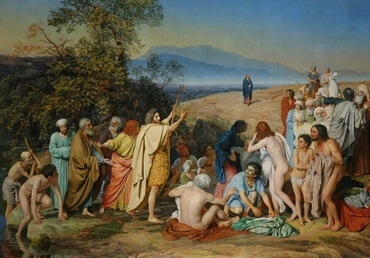17
οτι ο νομος δια μωυσεως εδοθη η χαρις και η αληθεια δια ιησου χριστου εγενετο
17
οτι ο νομος δια μωυσεως εδοθη η χαρις και η αληθεια δια ιησου χριστου εγενετο
വഴി Brian David

The Lord’s relationship with the earliest people – those of what the Writings call the "Most Ancient Church" – could be described as "heart-to-heart." His love could flow to them in very pure forms that acted directly on their emotions; the love they returned to Him and turned to each other was all but automatic. But they were free, and eventually turned away, wanting a greater sense of identity and a greater sense of controlling their own lives, desires that ultimately led them to appalling depths of evil. So the Lord raised up a second church, the Ancient Church. His relationship with its people could be described as "mind-to-mind." They had deeply symbolic stories, and could understand their spiritual messages; they could also see the Lord’s love expressed in all the details of the natural world. They understood the Lord, as much as human beings can. But pride of intelligence ultimately led to their downfall, as they turned that understanding away from the Lord toward idolatry and magic.
So the Lord raised a third church, among the Children of Israel. With this one, the relationship could be described as "body-to-body." The people were too selfish for the Lord to affect their hearts and too worldly for Him to affect their minds, but through punishment and rules He could govern their actions, forcing them into rituals and forms that had spiritual meaning, even if the people themselves did not understand. Through them He preserved some of the wisdom of the Ancient Church, and through them He created a new container for his divine truth in the form of the Old Testament.
This was done through Moses, of course, and in the form of what Jews called "the Law" – the most external form of the Lord’s truth.
When the Lord came as Jesus, though, he did it to start a return to more internal connections. He opened up the Law to show the love and caring inside, and led people to see that faith was a matter of embracing divine truth in the mind and the heart, not obedience to physical ritual. The container was necessary, but the contents were the point. He brought truth – real, internal truth – and grace, which represents the delight of truth.
©2024 New Christian Bible Study Corporation. All rights reserved. Printed from newchristianbiblestudy.org
ResponsiveVoice വാണിജ്യേതര ലൈസൻസിന് കീഴിൽ ഉപയോഗിക്കുന്നു 
©2024 പുതിയ ക്രിസ്ത്യൻ ബൈബിൾ പഠന കോർപ്പറേഷൻ. എല്ലാ അവകാശങ്ങളും നിക്ഷിപ്തം. ഉപയോഗ നിബന്ധനകൾ | സ്വകാര്യതാനയം.